How often do people think about what happens to a light bulb after it stops working? Can a simple household item like a light bulb become a threat to the environment or public safety? In the UK, millions of bulbs are discarded each year, but only a fraction are disposed of correctly. Whether it’s a modern LED or an old fluorescent tube, each type of bulb requires careful handling and proper disposal.
Throwing light bulbs in the bin may seem convenient, but it’s not always legal or environmentally responsible. From hazardous waste concerns to recycling opportunities, this guide outlines the top five ways to dispose of light bulbs safely and responsibly across the UK and why doing it right makes all the difference.
What Happens If You Throw Light Bulbs in the Bin?
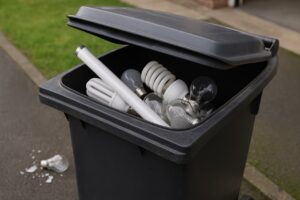
Most household waste ends up in landfill or incineration facilities. When light bulbs, particularly those containing hazardous substances, are mixed with general rubbish, the consequences can be severe. Fluorescent and energy-saving bulbs, for example, contain small amounts of mercury. When improperly discarded, this toxic element can leach into the soil and waterways, posing a danger to ecosystems and human health.
Besides environmental hazards, broken glass from discarded bulbs can cause injuries to waste workers. Councils also warn that light bulbs in recycling bins often contaminate recyclable materials, resulting in entire batches being sent to landfill.
Under the UK’s Waste Electrical and Electronic Equipment (WEEE) regulations, many types of bulbs are classed as electrical waste. Disposing of them in your household bin could breach local council guidelines and even result in penalties.
Can You Recycle All Types of Light Bulbs in the UK?
The answer depends on the type of bulb. Some light bulbs are recyclable and others are not but that doesn’t mean they can all be handled the same way. UK recycling facilities are equipped to process certain bulbs that contain reusable materials, while others, due to the mix of components, are not suitable for recycling and must go to general waste.
Recyclable bulbs include:
- LED bulbs
- Compact Fluorescent Lamps (CFLs)
- Energy-saving bulbs
- Fluorescent tubes
These are accepted at designated recycling points such as council recycling centres and participating retail stores. They are processed through specialist facilities that can extract glass, metals, and, where applicable, neutralise hazardous substances like mercury.
Non-recyclable bulbs include:
- Incandescent bulbs
- Halogen bulbs
These contain materials that are difficult to separate and cannot be economically recycled in the UK. They are treated as general waste and must be disposed of accordingly, though precautions should still be taken to prevent injury or damage.
Why Does Light Bulb Disposal Need Special Care?
Light bulbs are far more than simple glass enclosures. Many types contain complex materials, including gases, metals, and coatings that require specialist handling. Fluorescent tubes and CFLs, for instance, include mercury vapour, which, even in small amounts, is highly toxic. If such bulbs are broken or incinerated improperly, mercury can be released into the air, soil, or water.
Older incandescent and halogen bulbs don’t contain hazardous chemicals, but the glass is fragile and can be dangerous when shattered. Additionally, throwing bulbs in mixed recycling contaminates the stream, making other recyclable materials unusable.
Because of these risks, it’s essential that light bulbs are treated as a special waste category and disposed of through the correct channels. This ensures safety and supports the UK’s national recycling and environmental goals.
Top 5 Ways to Dispose of Light Bulbs Safely and Responsibly
1. Take Light Bulbs to a Council Recycling Centre
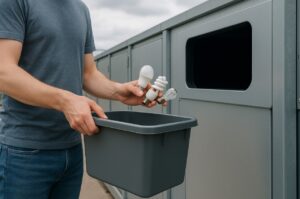
One of the most reliable and environmentally responsible ways to dispose of used light bulbs in the UK is through local council recycling centres. These facilities accept a wide range of electrical items, including most types of light bulbs such as LEDs, CFLs, and fluorescent tubes.
To find the nearest facility, residents can visit their local authority’s website and search for a Household Waste Recycling Centre (HWRC). Most centres provide clearly marked bins or drop-off areas specifically for electrical waste. Some councils may also list which types of bulbs are accepted, so it’s worth checking in advance.
When visiting a recycling centre, it’s advisable to transport bulbs in a padded container or the original packaging to avoid breakage during transit.
2. Use Retailer Take-Back Schemes
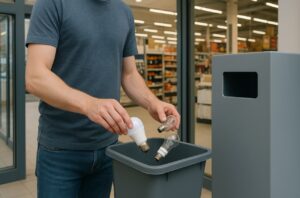
Several major UK retailers operate take-back schemes as part of their obligation under the WEEE Directive. These schemes allow customers to return old or non-functional light bulbs to stores for proper recycling, usually at no extra cost.
Retailers such as B&Q, Screwfix, Currys, and IKEA participate in these initiatives. In most cases, customers can drop off bulbs at dedicated recycling points located near the entrance or customer service desk. Some stores only accept bulbs when a new one is purchased, while others offer unconditional drop-off options.
Retailer take-back schemes are a convenient solution for people who live far from a recycling centre or who regularly purchase bulbs in-store.
3. Dispose of Non-Recyclable Bulbs in General Waste (Safely)

Although certain light bulbs cannot be recycled, they must still be disposed of responsibly. Incandescent and halogen bulbs fall into this category. These bulbs should never be placed in your recycling bin, as they contaminate recyclable waste.
Instead, they must go in your general waste bin. Before doing so, wrap the bulb in paper, tissue, or its original packaging. Placing the wrapped bulb inside a small cardboard box is even better, as it prevents injury to sanitation workers and damage to waste processing equipment.
If the bulb is broken, extra care should be taken to collect all shards and safely seal them in a container before disposal.
4. Arrange a Hazardous Waste Collection for Fluorescent Tubes
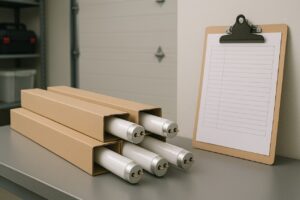
Fluorescent tubes, commonly used in offices and garages, contain mercury and are classified as hazardous waste. These cannot be disposed of in normal waste or recycling bins and should never be broken intentionally.
Many local authorities offer hazardous waste collection services or provide designated drop-off points for such items. Booking a collection can typically be done through your council’s website. This service is particularly useful for businesses or households with multiple tubes.
If a fluorescent tube breaks accidentally, ventilate the room, wear gloves, and use stiff paper to gather the pieces. Avoid vacuuming, as this can disperse mercury particles into the air.
5. Dispose of Light Bulbs Using Waste Removal Services
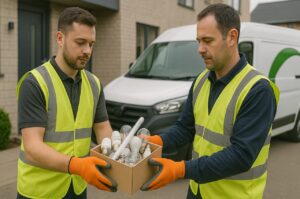
For those who prefer a hassle-free, compliant, and efficient solution, hiring a professional waste removal service is one of the most effective ways to dispose of light bulbs safely, especially when dealing with large quantities or mixed types of bulbs from a home renovation, office clearance, or commercial premises.
Waste Removal Near Me offers tailored collection services across the UK, making light bulb disposal simple for both households and businesses. Whether it’s a small box of LED and halogen bulbs or bulk fluorescent tubes, trained waste handlers ensure that every item is sorted, collected, and sent to the appropriate facility including hazardous waste treatment centres when needed.
This method is particularly ideal for:
- Landlords clearing out properties
- Businesses upgrading their lighting systems
- Builders or contractors handling post-renovation cleanups
- Households that want convenient pick-up without visiting a recycling centre
By using a licensed waste removal company like Waste Removal Near Me, you ensure compliance with UK waste disposal regulations, reduce the risk of environmental harm, and save time and effort.
In many cases, services can be scheduled online with same-day or next-day collection, offering flexibility for urgent or ongoing disposal needs. Collection teams typically sort the waste on-site and ensure that recyclable and non-recyclable bulbs are treated accordingly.
Not only is this method convenient, but it also aligns with environmentally responsible practices as most professional removers partner with certified recycling and treatment facilities.
Light Bulb Disposal Guide by Type
| Bulb Type | Recyclable | Disposal Method | Contains Hazardous Material? |
| LED | Yes | Council recycling / Retailers | No |
| Fluorescent Tubes | Yes | Hazardous waste collection | Yes (mercury) |
| Energy-Saving (CFLs) | Yes | Council centres / Retailers | Yes (mercury) |
| Halogen | No | General waste (wrapped) | No |
| Incandescent | No | General waste (wrapped) | No |
Conclusion: Don’t Let Your Light Bulbs End Up in Landfill
Every type of light bulb, from simple incandescent to advanced LEDs, has a proper path for disposal and choosing the right one is a small but meaningful step toward environmental responsibility. In the UK, it’s never been easier to recycle or safely dispose of bulbs through council services, retailer take-back schemes, and hazardous waste collections.
Understanding the rules and risks associated with different bulb types helps protect our environment and ensures compliance with national regulations. By investing in longer-lasting bulbs like LEDs and disposing of older types correctly, households and businesses can both reduce waste and support sustainable practices.
Make the effort. Choose the right method. And keep harmful materials out of landfill.
Frequently Asked Questions About Bulb Disposal
What types of light bulbs can I recycle in the UK?
You can recycle LED bulbs, compact fluorescent lamps (CFLs), energy-saving bulbs, and fluorescent tubes. These should be taken to council centres or participating retail stores.
Where can I take broken fluorescent tubes?
Broken fluorescent tubes should be taken to a designated hazardous waste site. Some local councils also offer special collection services for hazardous household waste.
Is it safe to put halogen bulbs in my bin?
Halogen bulbs can go in general waste but must be wrapped securely to prevent breakage and injury. Never put them in your recycling bin.
Can I return light bulbs to shops for recycling?
Yes, many UK retailers offer take-back schemes for used or broken light bulbs, especially if you’re buying new ones. Check with stores like B&Q, IKEA, and Currys.
What should I do if a mercury bulb breaks?
Ventilate the room, wear gloves, and avoid vacuuming. Use stiff cardboard to collect fragments and place them in a sealed container for disposal at a hazardous waste site.
Do recycling centres accept incandescent bulbs?
No. Incandescent bulbs are not recyclable in the UK. They must be disposed of in your general waste bin after wrapping to avoid injury.
Are LEDs better for the environment?
Yes. LEDs last longer, use less energy, and don’t contain hazardous materials. They also reduce the frequency of disposal, making them an eco-friendly lighting option.






